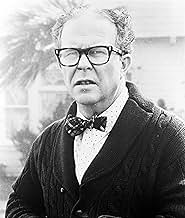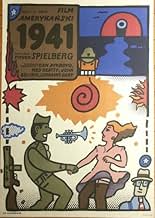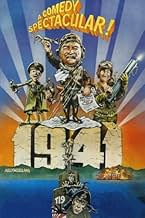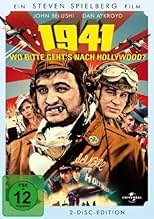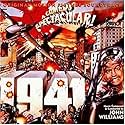1941
- 1979
- Tous publics
- 1h 58min
NOTE IMDb
5,8/10
38 k
MA NOTE
Les Californiens hystériques se préparent à une invasion japonaise dans les jours qui suivent Pearl Harbor.Les Californiens hystériques se préparent à une invasion japonaise dans les jours qui suivent Pearl Harbor.Les Californiens hystériques se préparent à une invasion japonaise dans les jours qui suivent Pearl Harbor.
- Réalisation
- Scénario
- Casting principal
- Nommé pour 3 Oscars
- 6 nominations au total
Toshirô Mifune
- Cmdr. Akiro Mitamura
- (as Toshiro Mifune)
Lucille Benson
- Gas Mama (Eloise)
- (as Lucille Bensen)
Jordan Cohen
- Macey Douglas
- (as Jordan Brian)
Elisha Cook Jr.
- The Patron (Dexter)
- (as Elisha Cook)
Avis à la une
With all the stars in this movie, it's bound to be full of laughs. In one of the greatest comedies ever made (in my mind), a group of American Army soldiers, a lunatic pilot (Belusi), and local citizens take on each other and a submarine full of incompetent Japanese sailors with victory in their eyes. With an unbelievable collection of actors, and probably a film that Spielberg would like to forget he made, 1941 ranks up there with Caddyshack and other classic comedies.
As outlandish and hysterical as the war insanity of 1941 may seem, the plot tracks almost exactly a real incident reported the night of Feb. 24, 1942, in Los Angeles that began when Navy intelligence reported an attack by unidentified objects on their radar could be expected within the next 10 hours. Early the morning of the 25, radar tracked objects 120 miles west of Los Angeles and a blackout was ordered, triggering a flood of reports about enemy planes. Planes wre reported by the coast artillery near Long Beach (25 of them at 12,000 feet). Four batteries of anti aircraft guns at Santa Monica opened fire on a balloon with a flare and all hell broke loose, with so much ack-ack and searchlights scanning the sky that utter confusion reigned for at least three hours with reports of swarms of planes (hundreds in some cases) flying in at every altitude imaginable. Some 1,440 rounds of ammunition were fired at airplanes that never dropped a single bomb. There were reports four enemy planes had been shot down, including one that supposedly landed in flames at a Hollywood intersection. If this all sounds familiar, read on. At dawn, the only damage found was caused by stray ack-ack fire and traffic wrecks during the blackout. The Navy said the next day there were no enemy planes. The Army interviewed people and decided there were at least one to five planes over LA. The War Department then announced the planes must have come from secret air fields in California or Mexico or from Japanese submarines. The next day the Los Angeles Times criticized the "considerable public excitement and confusion" caused by the alert that scared 2 million people. One California politician wanted to know if it was a calculated prank to move California's defense industries inland to other states. The Washington Post followed on Feb. 27 with condemnation of the military's stubborn silence on the issue and the New York Times jumped in on Feb. 28 by calling the entire episode "incredible" and a display of "expensive incompetence." The movie is a wonderful glimpse of this real hysteria, a real incident and with quotes pulled right out of newspaper articles. When Robert Stack wants to know "where are the bombs?" that is the same question the Air Force and Navy asked when reports came in about the thousands of planes attacking LA. All this information is available from government files on Air Force history from the Government Printing Office in Washington, D.C. The Japanese, by the way never flew planes over LA, but did fly over Seattle, they said after the war. I LOVE 1941. It got everything absolutely right. Right down to Belushi's plane crashing into the street and crazies going off searching for hidden airfields near Bakersfield or Barstow or where ever. This was NOT a comedy. It was just about comical people. It should have won an Oscar for BEST DOCUMENTARY.
There comes a time in every new filmmaker's career when a few initial successes makes them feel invulnerable and leads them to believe that they can do anything and get away with it, only for their hubris to be mercilessly destroyed when their next project turns out to be an absolute disaster.
1941 is an end product of Steven Spielberg's hubris that presents the now revered filmmaker tackling the genre of comedy after finding astonishing success with Jaws & Close Encounters, but this time he spectacularly fails at it. Arguably the worst film of his career, 1941 is nothing less than an eyesore.
Set during the Second World War, the story of 1941 follows the hysteria that grips the Californians in the wake of the bombing of Pearl Harbour. As paranoia sets in & chaos erupts all over the state, civilians & soldiers prepare for the Japanese invasion, while a lost Japanese submarine sends its crew to scout out the madness.
Directed by Steven Spielberg, 1941 finds the director trying way too hard in an effort to make the audience laugh but he only ends up making a mess of everything in the process. It appears as if Spielberg simply wanted to blow everything up and had his wish fulfilled with this big budget, big cast comedy that isn't even remotely funny.
The film is an exaggeration of everything. All the set pieces are either destroyed or blown up by the end. People keep falling here n there throughout the movie. All the characters are hyperactive. Performances are equally crazy, and not in a good way. Still, its energetic camerawork, extravagant special effects & John Williams' score is a plus.
On an overall scale, 1941 is a poorly conceived, awfully written & terribly executed example of blockbuster filmmaking and is a rare failure from a filmmaker who would later go on to become one of the greatest storytellers of all time. In retrospect, it's a bitter medicine that Spielberg needed, for 1941 didn't just knock some sense back into him and sober him up but also made him savour his future successes and not take his reputation for granted. A necessary dud.
1941 is an end product of Steven Spielberg's hubris that presents the now revered filmmaker tackling the genre of comedy after finding astonishing success with Jaws & Close Encounters, but this time he spectacularly fails at it. Arguably the worst film of his career, 1941 is nothing less than an eyesore.
Set during the Second World War, the story of 1941 follows the hysteria that grips the Californians in the wake of the bombing of Pearl Harbour. As paranoia sets in & chaos erupts all over the state, civilians & soldiers prepare for the Japanese invasion, while a lost Japanese submarine sends its crew to scout out the madness.
Directed by Steven Spielberg, 1941 finds the director trying way too hard in an effort to make the audience laugh but he only ends up making a mess of everything in the process. It appears as if Spielberg simply wanted to blow everything up and had his wish fulfilled with this big budget, big cast comedy that isn't even remotely funny.
The film is an exaggeration of everything. All the set pieces are either destroyed or blown up by the end. People keep falling here n there throughout the movie. All the characters are hyperactive. Performances are equally crazy, and not in a good way. Still, its energetic camerawork, extravagant special effects & John Williams' score is a plus.
On an overall scale, 1941 is a poorly conceived, awfully written & terribly executed example of blockbuster filmmaking and is a rare failure from a filmmaker who would later go on to become one of the greatest storytellers of all time. In retrospect, it's a bitter medicine that Spielberg needed, for 1941 didn't just knock some sense back into him and sober him up but also made him savour his future successes and not take his reputation for granted. A necessary dud.
i can't believe some of the comments on this movie. did someone really think this was supposed to be an accurate portrayal of wwii california? IT'S A COMEDY! and a good one. i agree that the christmas tree scene shouldn't have been cut, but then again maybe spielberg didn't want to undermine the gritty realism that some reviewers were looking for. p.s. - by far it's mickey rourke's best role.
Why is it, in our society, that a movie's success is rated on monetary value?As with "Always", another Spielberg flop, I love "1941".It's a shame when a movie's success can be judged on box office revenue only.It's a great deal of fun, and it's what movies should be about, a chance to laugh,to smile, and if done correctly, a chance to leave our lives for a couple of hours."1941" may not be at the top of all time movie favorites, they're saving that space for the BIG money makers,But it belongs at top of true movie lovers lists everywhere!And to Stash,It's seems that "Close Encounters of a Third Kind"was another Spielberg Film, before "1941", that some might consider as BIG!
Le saviez-vous
- AnecdotesSome scenes were so noisy during filming that the crew could not hear Steven Spielberg yell "Cut". He had to fire a prop machine gun in the air to get the action to stop.
- GaffesHerbie and Claude change position on the ferris wheel. Spielberg did that deliberately for comedic effect.
- Citations
Japanese soldier: [trying to squeeze a large radio into the sub] We've got to figure out how to make these things smaller!
- Crédits fousEnd credits feature scenes showing cast members screaming.
- Versions alternativesThe version released on network television and VHS/DVD/laserdisc is Spielberg's original director's cut, running 146 minutes, fleshing out sub-plots and characterizations, including:
- Wally and Dennis getting thrown out onto the street by Mr. Malcomb after he fires them from the diner where they work.
- Miss Fitzroy lecturing a group of women, Betty and Maxine among them, about tonight's USO dance which is interupted by a group of Army service men and Sailors entering and chanting wanting the women.
- A department store scene with Wally fussing about buying an expensive new zoot suit and Dennis sounding a phoney air-raid siren which leads to panic in the store including a gun-toting Santa Claus yelling out command orders which is revealed to be a set up by Wally who walks out of the store wearing the zoot suit while Dennis meets the twin girls for the first time.
- A scene with Scioli outside his house arguing with his non-English speaking wife about converting their car into an armored car while talking with Claude about sending him and someone else atop the Santa Monica ferris wheel on a spot mission for Japanese planes.
- A extra scene with Ito and the I-19 Japanese submarine shore party disguising themselves as Christmas trees in a remote Christmas tree lot and the drunken Hollis Wood trying to "chop" them down which leads to his capture.
- Scioli arriving at the ferris wheel with Claude and Herbie and explaing to them about their mission in the ferris wheel.
- A dinner scene at the Douglas home and Ward explaining to Betty about her going to the USO dance and telling her about the pros and cons about meeting servicemen.
- A barracks scene with Odgen Johnson Jones arriving for the first time at the barracks and imediately quarling with the racist Foley about property lines within their quarters.
- A scene outside the USO club where Wally arrives and meets with Martinez and his Zoot Suit friends where they are denied access to the club where Corporal Stretch shows up and sets Wally's zoot suit afire which nearly leads to a riot between the Zoot Suiters and the Servicemen. Wally then meets Dennis dressed up as a Marine in order to gain entrance into the club with the twins as his dates.
- Additional dialoge between Captain Birkhead and Donna in their car on the way to the airstrip and being afraid of the dark.
- Another barracks scene where Sergeant Tree breaks up a fistfight between Jones and Foley by informing them about the riot on Hollywood Blvd. and showing them climing into their tank and starting it up.
- A scene of the Japanese submarine I-19 arriving for the first time outside the Douglas house and the sub's entire crew on the deck watching Joan Douglas taking a bath through the bathroom window.
- A scene of the tank traveling down a residential street and Wally shooting up Officer Miller's police car to pieces, sending the policeman and some paserby's running for their lives.
- ConnexionsFeatured in At the Movies: Special Show: The Magic of Spielberg (1984)
- Bandes originalesDown by the Ohio
Music by Abe Olman (uncredited)
Lyrics by Jack Yellen (uncredited)
Performed by The Andrews Sisters
Courtesy of MCA Records, Inc.
Meilleurs choix
Connectez-vous pour évaluer et suivre la liste de favoris afin de recevoir des recommandations personnalisées
Détails
- Date de sortie
- Pays d’origine
- Langues
- Aussi connu sous le nom de
- The Night the Japs Attacked
- Lieux de tournage
- Gold Beach, Oregon, États-Unis(opening scene with sub)
- Sociétés de production
- Voir plus de crédits d'entreprise sur IMDbPro
Box-office
- Budget
- 35 000 000 $US (estimé)
- Montant brut aux États-Unis et au Canada
- 31 755 742 $US
- Week-end de sortie aux États-Unis et au Canada
- 2 701 898 $US
- 16 déc. 1979
- Montant brut mondial
- 92 455 742 $US
- Durée1 heure 58 minutes
- Couleur
- Rapport de forme
- 2.39 : 1
Contribuer à cette page
Suggérer une modification ou ajouter du contenu manquant



